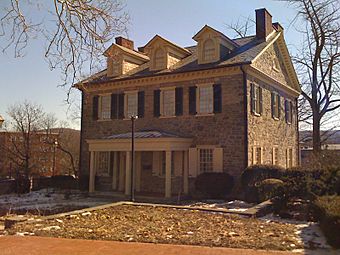Trout Hall facts for kids
|
Trout Hall
|
|

Trout Hall in Allentown in June 2008
|
|
| Location | 414 West Hamilton Street, Allentown, Pennsylvania, U.S. |
|---|---|
| Area | 0.8 acres (0.32 ha) |
| Built | 1768-1770 |
| Architectural style | Georgian |
| NRHP reference No. | 78002425 |
Quick facts for kids Significant dates |
|
| Added to NRHP | November 14, 1978 |
Trout Hall is a really old and important house in Allentown, Pennsylvania. It's in Lehigh County, Pennsylvania. This stone house was built a long time ago, between 1768 and 1770. It has two and a half stories and was built in the Georgian style.
A man named James Allen built Trout Hall as his summer home. He was the third son of William Allen, who founded Allentown. Today, Trout Hall is home to the library and museum of the Lehigh County Historical Society.
Contents
History of Trout Hall
The 1700s: Building a Summer Home
In 1735, a rich merchant named William Allen bought a huge piece of land. It was about 5,000 acres in what was then the Province of Pennsylvania. This was a colony of Great Britain.
By 1762, William Allen planned a town with 42 blocks. He called it Northampton Towne. But people usually called it Allen's Town. Later, it became Allenstown, and then officially Allentown.
James Allen (1742-1778) was William Allen's third son. He became a lawyer. In 1767, James Allen was elected to the Philadelphia city council. He also joined the Pennsylvania Assembly.
James was very busy in Philadelphia. He often traveled 60 miles to Allentown. Because of these trips, he decided he needed his own house there. He built a two-story stone house. He named it Trout Hall because there were so many trout fish in the nearby creeks and the Lehigh River.
James Allen passed away in 1778. After his death, his wife remarried. His daughters often stayed at Trout Hall.
The 1800s: New Owners and a College
In 1789, James Allen's daughters left Allentown. Trout Hall was empty for many years. In 1825, James's oldest daughter, Anne Penn Greanleaf, gave part of the property to her own daughter. At this time, the name Trout Hall was changed. The house became known as The Livingston Mansion.
The Livingston family were merchants. In 1847, they had some business problems. The house and land were sold to help cover their losses. The new owner, Comegys Paul, sold the house just one week later. He made a profit from the sale.
In 1848, the house became the Allentown Seminary. Later, in 1867, it was the first home of Muhlenberg College. The college later moved to its current campus.
The 1900s: Becoming a Museum
On January 9, 1904, the Lehigh County Historical Society was started. Their goal was to find and fix historical places in Lehigh County. They wanted to save Trout Hall's history. They fixed the east side of the house, which had not been touched in many years.
In 1905, Muhlenberg College moved to its new campus. The Historical Society then renamed the building Trout Hall again.
Today, Trout Hall is a museum. It has items from the Revolutionary War for people to see. It also shows off the house's old 18th-century design.
In 1978, Trout Hall was added to the National Register of Historic Places. This means it is recognized as a very important historical site.
See also
 | Shirley Ann Jackson |
 | Garett Morgan |
 | J. Ernest Wilkins Jr. |
 | Elijah McCoy |



